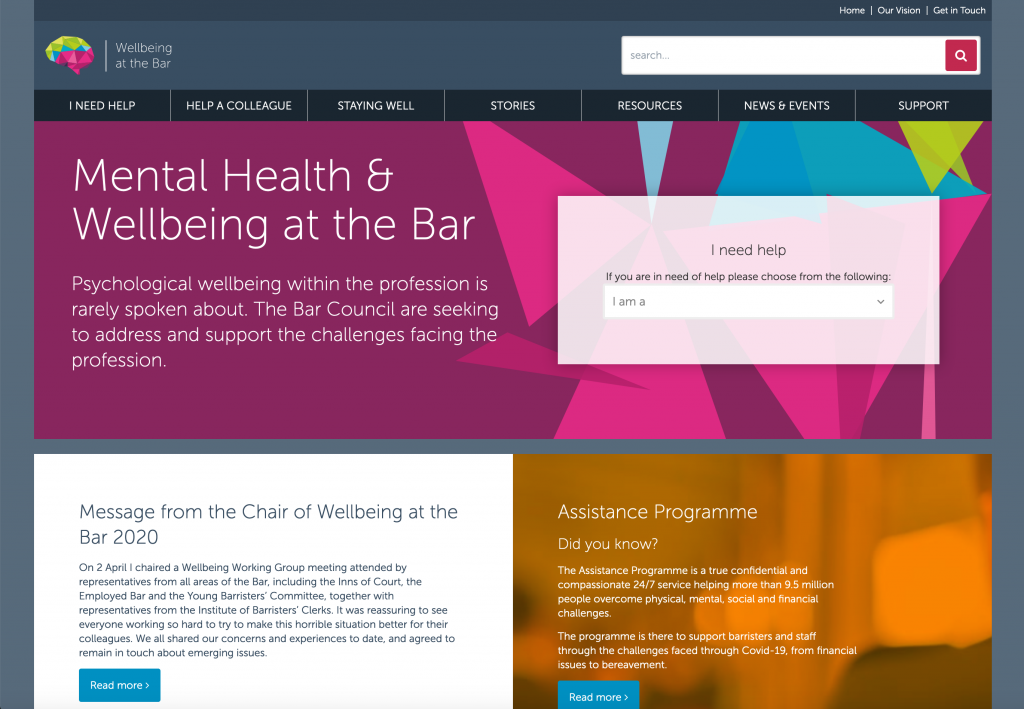Any profession will have its own trials and tribulations, and the legal profession is certainly no exception, posing its own set of challenges that can cause strain upon the mental health of all those involved. Given the increasing societal awareness and the importance it plays in our day-to-day functioning, maintaining good wellbeing is key to flourishing not only as a lawyer, but as a human more generally. One way to learn to keep mentally well is by seeking lessons from the experiences of others

Victoria Wilson is the 2020 Chair of Wellbeing at the Bar, Chair of the FLBA Wellbeing Subcommittee and a family barrister at Goldsmith Chambers. She tweets as @BarristerWilson. We spoke with her about various projects that she has worked on to improve wellbeing at the Bar, her own advice for dealing with mental health, and the helpfulness in talking to someone who understands the pressures of the profession.
How did you come to be involved with your work on mental health and wellbeing at the Bar?
It all began in 2015 when Sue Jacklin QC, who was at the time the Chair of the Family Law Bar Association (‘FLBA’), asked me and Cyrus Larizadeh QC to represent the FLBA on a newly-formed Bar Council Wellbeing at the Bar Working Group. To this day the Working Group consists of representatives from every single area of the Bar: all the Circuits, all four Inns of Court, and all the Specialist Bar Associations, over forty people in total. My involvement really followed on from there and in due course led to me being elected as the 2020 Chair of Wellbeing at the Bar and the Chair of the FLBA Wellbeing Subcommittee.
The Wellbeing at the Bar Working Group was established in response to a survey commissioned by the Bar Council in 2014, the first time there had been a survey about levels of wellbeing at the Bar. Its purpose was to provide some structured support for barristers in the light of the findings of that survey, which sadly contained various aspects of concern, such as high levels of perfectionistic pressure, with strong indicators of psychological ill-health and burnout.
What has been the biggest change you’ve seen in your various roles at the Wellbeing at the Bar Working Group and the FLBA Wellbeing Subcommittee?
Regarding the Wellbeing at the Bar Working Group, I would highlight three big changes which I consider to be equally important.

The first big change was that we created a dedicated Wellbeing at the Bar website for barristers and clerks: that was an important starting point to provide a hub of resources and information on a wide range of wellbeing issues that tend to challenge people in our profession and negatively impinge on our mental health. The website is regularly reviewed and updated, with an open invitation to all members of the Bar to notify us of any gaps that need addressing.
The second big change was that we implemented a free confidential Assistance Programme which includes a 24/7 telephone counselling helpline, access to face-to-face counselling and access to an online health portal.

The third big change is that the Bar Council now offers mental health training, as well as template policies and online assistance to those supporting colleagues who are unwell.
Regarding the FLBA Wellbeing Subcommittee, the biggest change is that we have provided much more intensive support since Covid-19: in practical terms that has entailed sending out wellbeing infographics and organising events by Zoom, with fantastic speakers, such as clinical psychologists, talking to us about resilience and other wellbeing topics which may be particularly relevant and useful at this difficult time.
Do you think there is sufficient mental health support for barristers at the moment?
I think there is always more to be done in terms of mental health support: one cannot overstate how demanding the job can be. It is excellent that we have our Wellbeing at the Bar website and our Assistance Programme, but we have to evolve to meet the ongoing and sometimes unexpected challenges that life at the Bar presents to us, and to keep reinforcing the message that being open about mental health is not a sign of weakness.
What are the most common issues of mental health and wellbeing that you have seen or experienced at the Bar, and how would you suggest working past them?
Anxiety is very prevalent at the Bar, and I think with any mental health issue it is worth considering whether we can take any practical steps to support our mental health in the circumstances, be that by taking any necessary medication, or by trying to adapt our lifestyle to enhance our psychological fitness, for example, by incorporating exercise, reducing alcohol intake or whatever else may assist.

I would also encourage people to turn to fellow members of the Bar for support: talking to someone who understands the pressures we are under can be really useful. I regularly receive calls from members of the Bar who wish to talk in confidence about particular issues that they are struggling with, and I am glad to be able to help.
Would you be comfortable to share your own experiences of mental health?
I have been very fortunate with my mental health, but in principle I have no issue with sharing my own experiences. One thing I have experienced is such intense dread regarding a forthcoming hearing that I have hoped to be spared from doing it by a minor accident on the way to court: without exception, every other barrister I have spoken to has at some point had that feeling too.
However, I think it is a very personal decision whether to discuss our own mental health experiences in public, and I do not for a moment criticise anyone who does not feel comfortable to do so.
What advice would you give to your younger self with regards to mental health?
To eat, sleep and exercise well to maintain a good foundation for positive mental health. To turn to others for support in difficult times and not to bottle it up. To remember that even the seemingly most confident people have their own struggles: outward appearances can be deceptive.
How do you manage high pressure and expectations?
I try to build my resilience system to counteract the pressures I am under, though of course that is often easier said than done. There is no doubt that life at the Bar entails both internal and external pressures. It is very typical of barristers, myself included, to feel enormous amounts of self-imposed pressure, such as the internal pressure to achieve an excellent result on every case, and those expectations are heightened by the external ones: constantly receiving papers at the last minute and being bombarded with emails all the time.

Insofar as the self-imposed ones are concerned, I try to keep a healthy balance by making sure I have a cut-off point to get some rest, by getting some fresh air if I can, and by talking to colleagues about particularly difficult cases to try to get a sense of perspective. Since lockdown I have made an effort to eat more healthily, whereas before on busy court days I would keep myself going by bingeing on crisps on the train.
How do you think the emphasis and focus on mental health and wellbeing is changing?
In recent years wellbeing has obviously become increasingly popular as a topic which resonates with society as a whole. Mental health and wellbeing are now talked about at the Bar, whereas before they were not: hopefully we are starting to get more on board with the idea that it is not a weakness to acknowledge that sometimes mental health can deteriorate.
How can chambers make their working environment more inclusive and mental-health friendly?
In essence each chambers needs to ensure that it has created a safe space for its members. We have tried to encourage this by assisting chambers with implementing wellbeing policies, and the Bar Council encourages chambers to put the effort into being mental-health friendly by awarding Certificates of Recognition to chambers that are able to demonstrate a genuine commitment to wellbeing. I think mentoring and buddy systems are really helpful too. It is important for chambers to listen to what its members are saying they would welcome in terms of mental health support.
Every effort should be made to promote a society in which everyone feels safe to seek support for their mental health and in which there are sufficient resources available to people who are struggling with their mental health.

Many thanks to Athena Kam for this interview in the new Mental Health and Wellbeing interview series. Athena is a second year law student at the University of Oxford, with a view of becoming a barrister one day. She is the forthcoming Secretary for the Oxford University Bar Society, having previously held the position of Mooting Officer. She hopes to help push for a more inclusive and mental-health legal profession.

